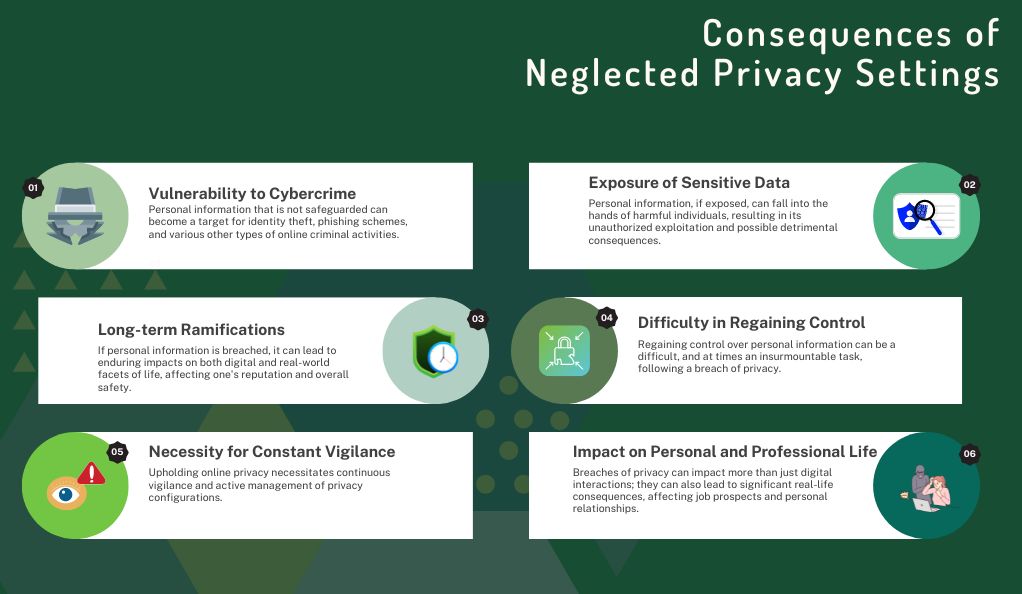Introduction to Social Media Privacy
In today’s digital era, social media is not just a platform for sharing and communication; it has evolved into a space that holds significant portions of our personal lives. With this integration comes a vital need for robust privacy measures.
The Evolving Landscape of Social Media
Social media has transformed from a simple communication tool into a complex digital world mirroring our real-life interactions. Users often share sensitive personal information, unaware of who might access it. This shift calls for a heightened awareness and understanding of privacy settings provided by these platforms.

Why Privacy Matters in the Digital Age
Privacy in social media is crucial for protecting one’s identity, personal information, and even mental well-being. Inappropriate use of personal data can lead to identity theft, cyberbullying, and other digital threats. Understanding and using privacy settings can significantly reduce these risks, helping users maintain control over their digital footprint.
These considerations set the foundation for why it’s essential to be informed and proactive about our social media presence. Establishing robust privacy settings is not just a technical necessity but a critical step in safeguarding our digital identity and personal wellbeing in this interconnected world.
Understanding Privacy Settings on Social Media
Navigating privacy settings on social media is essential for controlling who sees your personal information and posts. These settings often vary significantly across different platforms, making understanding them a key aspect of online security.
Navigating Different Platforms’ Settings
Each social media platform has its unique set of privacy controls, often found in the settings section. For instance, Facebook allows users to customize their profile visibility, post sharing options, and friend requests settings. Similarly, Instagram offers options to make accounts private, manage story sharing, and control message reception. Regularly reviewing and updating these settings is crucial to maintain desired levels of privacy.
Common Misconceptions about Social Media Privacy
A common misconception is that once set, privacy settings remain effective indefinitely. However, with frequent updates to platforms, privacy policies and settings can change, potentially altering your chosen privacy levels. Additionally, many users believe that ‘private’ accounts are completely shielded from outsiders. While these settings restrict access to your content, it’s important to remember that shared items can still be screenshot or reshared by connections, sometimes leading to unintended exposure.
The Importance of Privacy in Protecting Personal Information
In the digital realm, privacy is a shield that protects personal information from misuse. As social media platforms become a repository for sensitive data, understanding the importance of privacy settings is more crucial than ever.
Case Studies of Privacy Breaches
Instances of privacy breaches on social media often lead to identity theft, financial loss, and personal harm. For example, the misuse of personal photos and information has led to numerous cases of impersonation and fraud. These incidents highlight the risks associated with sharing personal data online and underscore the need for stringent privacy measures.
Consequences of Neglected Privacy Settings

- Vulnerability to Cybercrime: Unprotected personal information can be exploited for identity theft, phishing attacks, and other cybercrimes.
- Exposure of Sensitive Data: Personal details can become accessible to malicious parties, leading to unauthorized use and potential harm.
- Long-term Ramifications: Once personal data is compromised, it can have lasting effects on both online and offline aspects of life, including reputation and security.
- Difficulty in Regaining Control: After a privacy breach, reclaiming control over personal information can be challenging and sometimes impossible.
- Impact on Personal and Professional Life: Privacy breaches can affect not just online interactions but also have serious consequences in real-world scenarios, such as job opportunities and personal relationships.
- Necessity for Constant Vigilance: Maintaining privacy online requires ongoing attention and proactive management of privacy settings.
Individuals can significantly reduce these risks. Effective use of privacy settings not only safeguards personal data but also contributes to a safer online community. As such, privacy is not just a personal responsibility but a collective necessity in the digital age.
Practical Tips for Enhancing Your Social Media Privacy
In the age of digital connectivity, safeguarding your privacy on social media is not just wise – it’s necessary. Here are some practical tips to enhance your social media privacy effectively.
Setting Up Privacy Controls
Start by thoroughly exploring the privacy settings on each social media platform. Facebook, for instance, allows you to control who can see your posts, send friend requests, or even look you up via email or phone number. Instagram lets you make your account private, meaning only approved followers can see your posts. Here’s a quick checklist:
- Review and adjust your profile privacy settings.
- Limit the audience for your past and future posts.
- Enable additional security features, like two-factor authentication.
Best Practices for Maintaining Privacy

Beyond tweaking settings, there are best practices to follow:
- Be cautious about what personal information you share in your posts or bio.
- Regularly update your passwords and use strong, unique combinations.
- Be aware of the information shared in photos or posts, like location tags.
- Remember to log out of your accounts on shared devices.
Implementing these tips, you can take significant steps towards securing your online presence on social media platforms. Remember, privacy is a continuous effort that requires regular attention and adjustment.
The Role of Social Media Platforms in User Privacy
Social media platforms are at the forefront of managing and protecting user privacy. Their approach to data handling, privacy policies, and the tools they provide play a significant role in how users’ personal information is safeguarded. These platforms are responsible for creating an environment where users can feel secure about their data while navigating the complexities of the digital world. They must strike a balance between offering a seamless user experience and ensuring robust privacy protections. As guardians of vast amounts of personal data, these platforms have a pivotal role in setting the standards for online privacy.

Policies and Measures by Major Platforms
- Facebook
- Privacy Checkup Tool: Guides users through important privacy settings.
- Ad Preferences: Allows users to control the types of ads they see.
- Data Policy: Outlines how user data is collected, used, and shared.
- Twitter
- Customizable Data Sharing Preferences: Users can control how their data is used for advertising.
- Privacy Policy: Details the collection, use, and sharing of user data.
- Protected Tweets: Allows users to make their tweets visible only to approved followers.
- Instagram
- Private Account Option: Lets users control who can see their posts.
- Story Controls: Users can manage who sees their stories.
- Data Usage Policy: Explains how data is collected and used on the platform.
By implementing these policies and measures, social media platforms demonstrate their commitment to user privacy, allowing individuals to have more control over their personal information and online presence.
Balancing User Experience with Privacy Concerns
These platforms continuously work to balance enhancing user experience with safeguarding privacy. This includes introducing features like end-to-end encryption in messaging and options to control ad preferences. However, users should remain vigilant and regularly review platform updates and changes in privacy policies. Staying informed about these changes is crucial for maintaining control over personal information and understanding how it’s being used.
Social media platforms are essential in defining online privacy norms. By providing comprehensive privacy controls and transparent policies, they empower users to take charge of their digital footprint.
Beyond Settings: A Holistic Approach to Online Privacy
Enhancing social media privacy goes beyond adjusting settings; it involves adopting a holistic approach to protect your digital presence comprehensively.
Understanding Digital Footprints
Every action online, from liking a post to commenting on a thread, leaves a digital footprint. It’s vital to be aware of the trail you leave on social media platforms. This means being mindful of the posts you like, the comments you make, and the information you share. Remember, your digital footprint can be viewed by employers, marketers, and others, which can impact your personal and professional life.
The Importance of Being Mindful About What You Share
In the interconnected world of social media, what we choose to share can significantly impact our lives. Every post, photo, or status update contributes to the narrative we create online. This virtual persona is not just visible to friends and family, but potentially to a global audience, including current or future employers and professional connections. Therefore, it’s imperative to be selective and thoughtful about the information we share. Practicing mindfulness in our social media interactions not only helps in safeguarding our privacy but also in shaping the digital identity we present to the world. Below are key points to consider:

- Awareness of Your Digital Footprint: Every online action, such as likes and comments, contributes to your digital trail on social media.
- Impact on Personal and Professional Life: Be aware that what you do online can be seen by employers, marketers, and others, affecting both personal and professional aspects of your life.
- Risks of Oversharing: Sharing too much personal information, like location or daily routines, can be risky.
- Thoughtful Sharing: Before posting anything, consider if you are comfortable with the information being publicly accessible.
- General Sharing Guideline: As a rule, avoid sharing anything you wouldn’t want the general public to see, regardless of your privacy settings.
Adopting this holistic approach to online privacy empowers you to control your digital narrative actively. It helps ensure that your social media usage aligns with your privacy expectations and personal values.
Preparing for the Future: Evolving Trends in Online Privacy
As technology advances, the landscape of online privacy is rapidly evolving, bringing new challenges and opportunities. Staying informed about these trends is crucial for ensuring long-term protection of your digital identity.
Emerging Technologies and Their Implications
Technologies like artificial intelligence (AI) and machine learning are becoming more integrated into social media platforms. They have the potential to enhance user experience but also raise concerns about data privacy and surveillance. For instance, AI can personalize content but may also lead to more sophisticated data collection practices. Understanding these technologies and their implications on privacy is essential.
Staying Informed and Adapting to Changes
As privacy norms and regulations evolve, it’s important to stay updated. New laws like the General Data Protection Regulation (GDPR) in Europe and the California Consumer Privacy Act (CCPA) in the U.S. are reshaping data privacy standards. Users should be aware of these changes and how they affect their rights and control over personal information.
Preparing for the future involves adapting to these trends and being proactive about privacy. This means regularly updating your knowledge, reviewing privacy policies, and adjusting your social media practices accordingly. By doing so, you can ensure that your online presence remains secure in an ever-changing digital world.
Conclusion
Securing your online presence on social media requires more than just tweaking privacy settings; it demands a comprehensive understanding and proactive approach. From being informed about different platforms’ privacy options to recognizing the implications of emerging technologies, every aspect plays a crucial role in safeguarding personal information. It’s vital to be mindful of the digital footprints we leave and adapt to evolving trends and regulations in online privacy. By embracing a holistic approach towards privacy and staying informed, users can effectively navigate the complexities of the digital world, ensuring a safer and more controlled social media experience.








